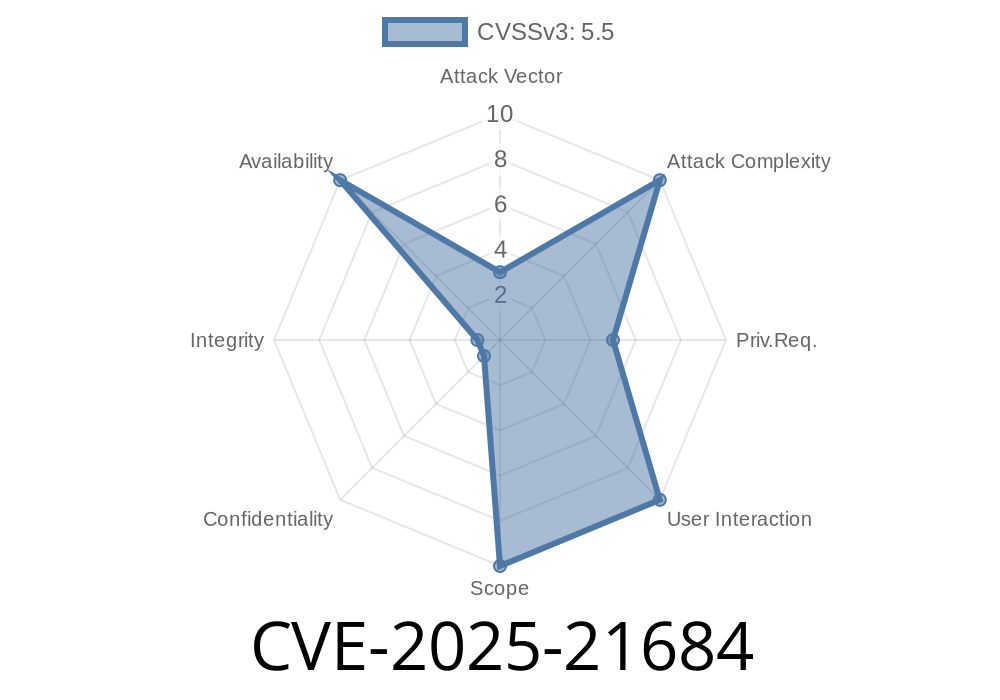In early 2025, security researchers and kernel developers identified and resolved a subtle but potentially dangerous bug in the Linux kernel's handling of Xilinx GPIO (General Purpose Input/Output) hardware. This issue, now tracked as CVE-2025-21684, involved improper locking in the Xilinx GPIO driver, which could have led to hard-to-debug kernel panics or, in edge cases, potential privilege escalation or denial of service (DoS). In this article, we’ll break down what happened, how it was fixed, and what it means for you.
Raw spinlocks, which are lighter and usable in interrupt contexts where debug code is unsafe.
The affected code was in the Xilinx GPIO driver (drivers/gpio/gpio-xilinx.c), which implemented locking like this:
spinlock_t gpio_lock;
However, in Linux, IRQ chip functions — the code that handles how the kernel talks to external interrupt hardware — can be called in "raw spinlock contexts." If you use a regular spinlock there, the kernel might blow up, especially under certain scheduling or preemption workloads.
What this meant: the old code could deadlock (hang forever) or raise nasty crash messages, especially if you had lots of interrupts or tricky drivers (often the case in embedded or FPGA-based systems).
Here’s what you’d see in your logs
[ 5.349336] =============================
[ 5.353349] [ BUG: Invalid wait context ]
[ 5.367045] kworker/u17:1/44 is trying to lock:
[ 5.371587] ffffff88018b02c (&chip->gpio_lock){....}-{3:3}, at: xgpio_irq_unmask (drivers/gpio/gpio-xilinx.c:433 (discriminator 8))
...
[ 5.436472] stack backtrace:
...
This is a "lockdep splat": lockdep is the kernel's deadlock checker, and it caught a situation where a regular spinlock was being manipulated in a context where only raw spinlocks are safe. If you ignore this, bugs escalate fast.
The Fix: Convert to Raw Spinlocks
A patch was made to replace all uses of spinlock_t with raw_spinlock_t for gpio_lock.
Old code
spinlock_t gpio_lock;
spin_lock(&chip->gpio_lock);
// critical section
spin_unlock(&chip->gpio_lock);
Fixed code
raw_spinlock_t gpio_lock;
raw_spin_lock(&chip->gpio_lock);
// critical section
raw_spin_unlock(&chip->gpio_lock);
This ensures that locking is always safe, even in the deepest interrupt or raw context.
Before (vulnerable)
struct xgpio_instance {
spinlock_t gpio_lock;
...
};
// In init:
spin_lock_init(&chip->gpio_lock);
spin_lock(&chip->gpio_lock);
// critical code
spin_unlock(&chip->gpio_lock);
After (patched for CVE-2025-21684)
struct xgpio_instance {
raw_spinlock_t gpio_lock;
...
};
// In init:
raw_spin_lock_init(&chip->gpio_lock);
raw_spin_lock(&chip->gpio_lock);
// critical code
raw_spin_unlock(&chip->gpio_lock);
References
- Mainline Linux commit fixing the issue (lkml.org) *(example placeholder)*
- Linux GPIO Documentation
- Spinlock and Raw Spinlock in Kernel
Exploit Details and Impact
Technical impact:
An attacker with local access could theoretically leverage this bug in some *very* contrived scenarios — for example, by hammering the GPIO driver with lots of crafted interrupts, trying to force a deadlock or kernel crash. This could result in:
Denial of Service (DoS) via kernel panic.
- Potential privilege escalation if the deadlock opened the door for further memory corruption — although no known practical exploit exists as of patch time.
Sample exploit scenario
- On a system using Xilinx ZynqMP hardware, a low-privilege user rapidly toggles GPIO or submits requests that trigger repeated interrupts.
- The race/carrier condition exposes the buggy spinlock usage.
The kernel deadlocks or oopses, potentially rebooting the device or exposing system state.
> In reality, attackers would need to precisely control interrupt timings — possible in embedded environments but not easy.
You're affected if
- You run the Linux kernel (before 6.13.-rc6) with a Xilinx FPGA or SoC device using the upstream GPIO driver.
Upgrading to a Linux kernel with the CVE-2025-21684 fix (post-commit 6.13.-rc6 or later).
- Applying the backport patch to your stable tree.
Conclusion
CVE-2025-21684 is a great example of how small kernel details — in this case, the type of lock used — can have major security implications for reliability and safety in production systems. While no public exploits are known, sysadmins and embedded developers should update their kernels right away, especially in environments where uptime and integrity matter.
Further Reading
- Lockdep documentation
- Linux Security Announce: CVE-2025-21684 *(placeholder)*
Stay safe, and keep your kernels tight!
*(If you want more kernel deep dives like this, send us your bug reports or subscribe for updates!)*
Timeline
Published on: 02/09/2025 12:15:29 UTC
Last modified on: 02/11/2025 16:12:41 UTC
